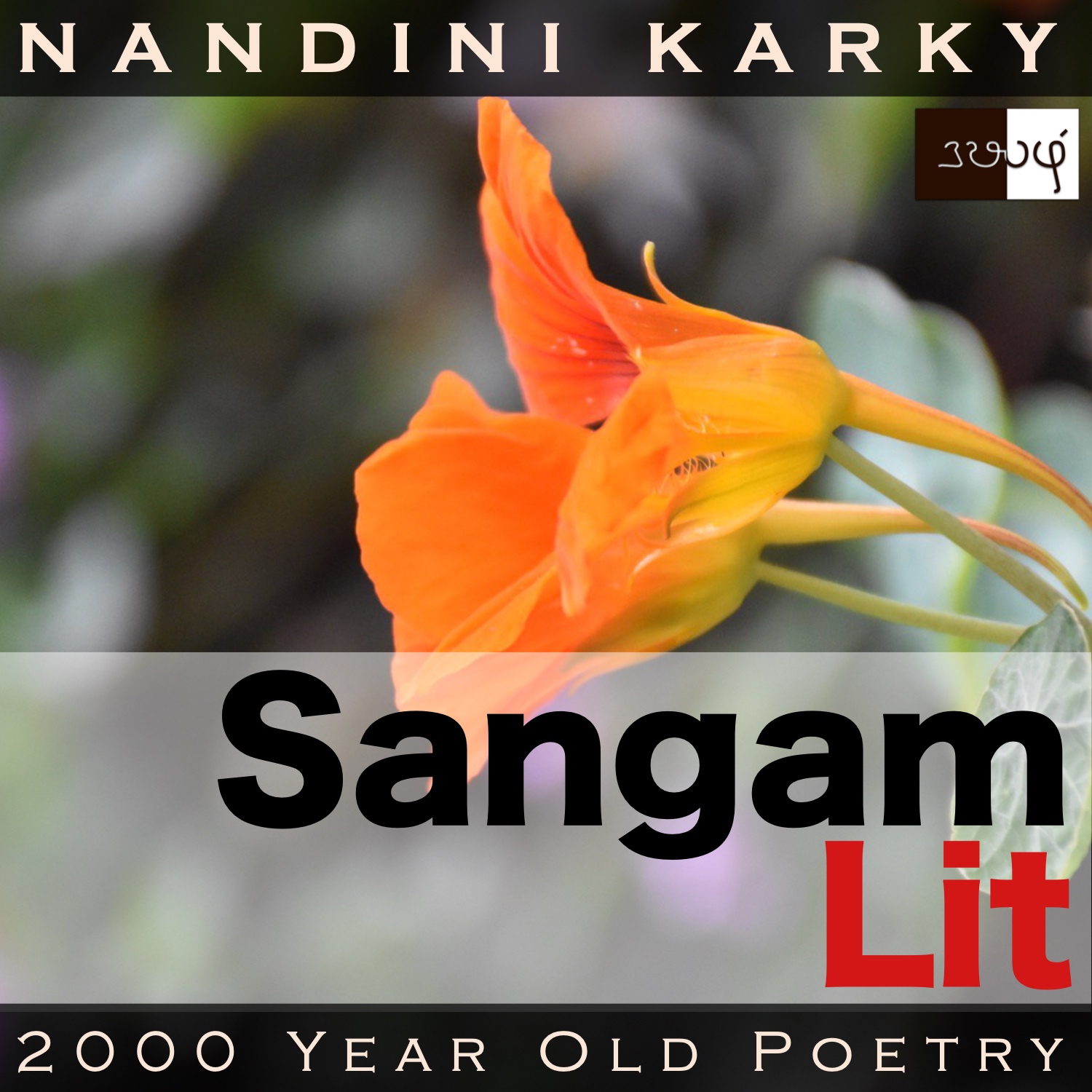Podcast: Play in new window | Download
Subscribe: Apple Podcasts | Spotify | Amazon Music | Android | iHeartRadio | TuneIn | RSS | More

In this episode, we perceive the effect of changing seasons on the land and the mind, as portrayed in Sangam Literary work, Natrinai 118, penned by Perunkadunko, a poet-king from the Chera dynasty. Set in the ‘Paalai’ landscape, the poem speaks in the voice of the lady to the confidante, describing the pained state of her heart.
அடைகரை மாஅத்து அலங்கு சினை ஒலியத்
தளிர் கவின் எய்திய தண் நறும் பொதும்பில்,
சேவலொடு கெழீஇய செங்கண் இருங்குயில்
புகன்று எதிர் ஆலும் பூ மலி காலையும்,
அகன்றோர் மன்ற நம் மறந்திசினோர் என,
இணர் உறுபு உடைவதன் தலையும், புணர் வினை
ஓவ மாக்கள் ஒள் அரக்கு ஊட்டிய
துகிலிகை அன்ன துய்த் தலைப் பாதிரி
வால் இதழ் அலரி வண்டு பட ஏந்திப்,
புது மலர் தெருவுதொறு நுவலும்
நொதுமலாட்டிக்கு, நோம் என் நெஞ்சே.
As the poem opens, we step on a shore with the words ‘அடைகரை’ meaning ‘banks of a river’. A cheerful mango tree greets us, when we see ‘மாஅத்து’ and perceive that it’s a lush ‘grove’, meeting ‘பொதும்பில்’. ‘இருங்குயில்’ tell us that there’s a ‘black koel’ around. ‘ஓவ மாக்கள்’ refers to ‘painters and artists’ and their weapon of choice, a brush appears too, with ‘துகிலிகை’. One of the flowers much preferred by Sangam women, the ‘பாதிரி’ or ‘trumpet flower’ announces itself. A beautiful sounding word ‘நொதுமலாட்டி’ is seen, meaning ‘an unknown girl’. Let’s see what the lady has to say about this girl shortly.
The man and woman have been in a married relationship. He parts away from her to complete a task. One day, during this period of separation, the lady turns to her confidante and says, “In the cool, fragrant orchard, by the river’s shore, filled with the swaying branches of the mango tree and budding sprouts, the red-eyed black ‘koel’ and its mate, coo with love to each other. This is the season of abundant flowers and it was marked by the lord, who parted from me, as the time of his return. As if to say he has forgotten me, now that time has passed and it’s the season when the blooming flower clusters dry up and wither. With a soft and fuzzy head, like that of an artist’s brush dipped in a sharp red dye, the ‘padiri’ flowers bloom with tender petals. Carrying these flowers on a plate, swarming with bees, arrives that strange girl, who sells fresh flowers in our streets. Whenever I glimpse at this flower-seller, my heart aches!” With these words, the lady reveals the state of her mind as the man stays away beyond the promised time of his return.
Now, for the little details in this poem. Time is tangible to these Sangam folks. They take it in with all their senses. In this poem, the time of the year is depicted by the sight of the swaying branches and green clusters of the mango tree, the sweet fragrance of the orchard as well as the sound of cuckoo birds in love, singing to each other. In speaking of this koel, there’s nuance. It’s described as a ‘red-eyed black koel’ and those words make the vibrant colours of a little bird in that huge grove dance before our eyes. Just hold on to the red of the bird’s eye in your mind’s eye for a while. The lady then details that all these changes in the world around signify the time of the year that’s ‘Ilavenil’ or the ‘spring’ season. This was the time the man said he would return. She concludes that he seems to have forgotten her, for now ‘spring’ has gone by and ‘Mudhuvenil’ or ‘summer’ is here. The sweltering season which wilts the blooming flowers of spring. But, there is a flower that still blooms and that’s the ‘padiri’ flowers, that the lady yearns for.
Connecting back to the red of the Koel’s eye, the lady talks about the artists and their brushes, dipped in red dye. The bristles of the brush are placed in parallel to the ‘padri’ flowers that are plucked by the flower seller, who sells every day, on the streets of their village. The lady seeing her, is filled with ache, for women then seemed to have abstained from wearing flowers or dressing themselves up, when the man of the house was away. Thus, a string of flowers seem to be woven with the pain of a lady, missing her man.
The poem makes me reflect on the concept of time and when I do that, it’s numbers that come to my mind immediately. Those blinking digits on a clock or a date on a sheet of paper! Refreshing to have glimpsed an era, a time, when time spoke another language, a real language, echoing the richness of that life and speaking directly to one’s heart!




Beautiful ❤️